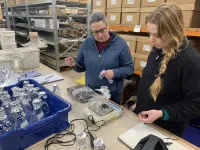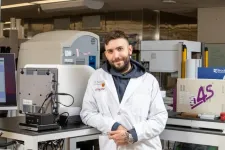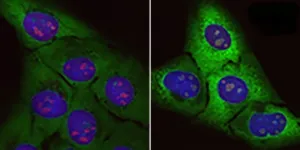(Press-News.org) An international team of scientists have warned against relying on nature providing straightforward ‘early warning’ indicators of a climate disaster, as new mathematical modelling shows new fascinating aspects of the complexity of the dynamics of climate.
It suggests that the climate system could be more unpredictable than previously thought.
By modelling the Atlantic meridional overturning circulation, one of the main ocean current systems, the team which included mathematicians from the University of Leicester have found that the stability of the system is much more complex than simple ‘on-off’ states as previously assumed. Switches between these states might lead to major changes in the regional climate of the North Atlantic region, yet a far cry from the massive impacts of a transition between the qualitatively different states.
But some of these minor transitions might eventually upscale to cause a major changeover between the qualitatively different states, with massive global climatic impacts. Early warning signals might be unable to distinguish the degree of severity of the ensuing tipping points. Like a tower of Jenga blocks, removing some blocks may affect the stability of the system, but we cannot be certain which block will bring the whole system tumbling down.
Their findings are published in Science Advances today (22 March) in a paper led by the Niels Bohr Institute at the University of Copenhagen.
The Atlantic meridional overturning circulation is one of the most important fundamental features of the climate system. It transports heat from low to high latitudes in the northern Atlantic, so it helps create positive thermal anomalies in northern and western Europe and in the North Atlantic region downwind. A slowdown of the circulation would result in a relative cooling in this region.
Predicting the behaviour of our climate, as in the Atlantic meridional overturning circulation, is challenging due to its incredible complexity. Scientists either need a model of the highest possible resolution, or try to understand its behaviour using a less resource intensive model that allows for rigorous statistical analysis.
Professor Valerio Lucarini from the University of Leicester School of Mathematical and Computer Science said: “Within each state there is a multiplicity of nearby states. Depending on where or what you are observing, you might find some indicators of nearing collapse. But it is not obvious whether this collapse will be contained to nearby states or lead to a major upheaval, because the indicators only reflect the local properties of the system.
“These states are the different ways that the Atlantic meridional overturning circulation organises itself at large scales, with key implications for the global climate and especially regionally in the North Atlantic. Under some scenarios, the circulation could reach a ‘tipping point’ where the system is no longer stable and will collapse. Early warning indicators tell us that the system might be jumping to another state, but we do not know how different it will be.
“In a separate investigation we have seen something similar occurring in paleoclimatic records: when you change your timescale of interest – just like a magnification lens - you can discover smaller and smaller scale distinct features that are indicative of competing modes of operation of the global climate. Paleoclimatic records of the last 65 million years allowed us to provide a new interpretation of the climate evolution over that time period, and reveal these multiple competing states.
“This study paves the way to looking at the climate through the lens of statistical mechanics and complexity theory. It really stimulates a new outlook of climate, in which you have to put together complex numerical simulations, observational evidence and theory in an unavoidable mixture. You have to appreciate and endorse this complexity. There is no shortcut, no free lunch in our understanding of climate, but we are learning a lot from it.”
‘Multistability and Intermediate Tipping of the Atlantic Ocean Circulation’ is published in Science Advances by Johannes Lohmann (Niels Bohr Institute, University of Copenhagen, Denmark), Henk A. Dijkstra (Utrecht University, Utrecht, the Netherlands), Markus Jochum (Niels Bohr Institute, University of Copenhagen, Denmark), Valerio Lucarini (University of Leicester) and Peter D. Ditlevsen (Niels Bohr Institute, University of Copenhagen, Denmark). More information, including a copy of the paper, can be found online at the Science Advances press package at https://www.eurekalert.org/press/vancepak/
Further background: ‘A punctuated equilibrium analysis of the climate evolution of cenozoic exhibits a hierarchy of abrupt transitions’ in Scientific Reports, DOI: 10.1038/s41598-023-38454-6, Link: https://doi.org/10.1038/s41598-023-38454-6
The project has received funding from the European Union’s Horizon 2020 research and innovation programme under grant agreement No. 820970 for the project TiPES, and from Danmarks Frie Forskningsfond under grant No. 2032-00346B, and by the European Research Council through the ERC-AdG project TAOC (project 101055096). END
Scientists explore complex pattern of tipping points in the Atlantic’s current system
New mathematical modelling of the Atlantic meridional overturning circulation – a system of ocean currents – shows greater complexity than previously thought
2024-03-22
ELSE PRESS RELEASES FROM THIS DATE:
University College Dublin seeking to appoint a Full Professor of Data Science for Weather and Climate
2024-03-22
As part of a new multi-million-euro academic research programme at University College Dublin (UCD) funded by Met Éireann (the Irish National Meteorological Service) to support the further development of weather and climate services for Ireland using data science and Artificial Intelligence (AI), UCD is seeking to appoint a Full Professor of Data Science for Weather and Climate.
This exciting new senior academic post is a permanent position in the UCD School of Mathematics and Statistics arising from a funding award of €5 million over five years from Met Éireann, ...
Scientists uncover evidence that microplastics are contaminating archaeological remains
2024-03-22
Researchers have for the first time discovered evidence of microplastic contamination in archaeological soil samples.
The team discovered tiny microplastic particles in deposits located more than seven metres deep, in samples dating back to the first or early second century and excavated in the late 1980s.
Preserving archaeology in situ has been the preferred approach to managing historical sites for a generation. However, the research team say the findings could prompt a rethink, with the tiny particles potentially compromising the preserved remains.
Microplastics are small plastic particles, ranging from 1μm (one thousandth of a millimetre) ...
Toronto researchers devise new way to find proteins for targeted treatment of disease
2024-03-22
Researchers at the University of Toronto and Sinai Health have created a new platform to identify proteins that can be co-opted to control the stability of other proteins — a new but largely unrealized approach to the treatment of disease.
The researchers developed a method to interrogate the entire human proteome for ‘effector’ proteins, which can influence the stability of other proteins via induced proximity. The study marks the first time researchers have searched for effector proteins on this scale, and has identified many new effectors that could be used therapeutically.
“We found more than 600 new effector proteins in 14,000 ...
Researchers invent artificial intelligence model to design new superbug-fighting antibiotics
2024-03-22
Attention editors: Under embargo by the journal Nature Machine Intelligence until Friday, March 22, 12 p.m. eastern
Hamilton, ON, Mar. 22, 2024 – Researchers at McMaster University and Stanford University have invented a new generative artificial intelligence model which can design billions of new antibiotic molecules that are inexpensive and easy to build in the laboratory.
The worldwide spread of drug-resistant bacteria has created an urgent need for new antibiotics, but even modern AI methods are limited ...
An avocado a day may improve overall diet quality, researchers report
2024-03-22
UNIVERSITY PARK, Pa. — Eating one avocado per day may improve overall diet quality, according to a team led by researchers in Penn State’s Department of Nutritional Sciences. Poor diet quality is a risk factor for many diseases, including heart disease, and many American adults have poor diet quality and do not meet key dietary recommendations provided by the Dietary Guidelines for Americans.
This study was led by Kristina Petersen, associate professor of nutritional sciences, and Penny ...
CU researchers describe tools to better understand CaMKII, a protein involved in brain and heart disease
2024-03-22
AURORA, Colo. (March 22, 2024) – The health impacts of a complex protein that plays a major role in the development of Alzheimer’s disease and heart conditions can be lessened by three kinds of drug inhibitors, according to scientists at the University of Colorado Anschutz Medical Campus.
In an overview of the protein and the inhibitors published today in the journal Cell Reports, the CU researchers discussed the best ways to use the interventions.
The protein, CaMKII, is ubiquitous in cells throughout the body but is perhaps best known for its prominent role in the brain and the heart. It is critical in learning and memory but if misregulated can ...
Theoretical physicist Carlo Rovelli to receive 2024 Lewis Thomas Prize
2024-03-22
From photons to atheism to Churchill’s extraterrestrial musings, the stunning breadth of Carlo Rovelli’s work has spurred readers to think deeply about the intersection of science and culture, transforming staggering complexity into widely accessible writing along the way.
For this artful ability to educate and engage, Rovelli will be presented with the 2024 Lewis Thomas Prize for Writing about Science at The Rockefeller University on April 9. Named after its first recipient, noted physician-scientist and essayist Lewis Thomas, the prize was ...
Your dog understands that some words “stand for” objects
2024-03-22
It’s no surprise that your dog can learn to sit when you say “sit” and come when called. But a study appearing March 22 in the journal Current Biology has made the unexpected discovery that dogs generally also know that certain words “stand for” certain objects. When dogs hear those words, brain activity recordings suggest they activate a matching mental representation in their minds.
“Dogs do not only react with a learned behavior to certain words,” says Marianna Boros (@FamDogProject) of the Department of Ethology at the Eötvös Loránd University, Budapest, Hungary, one of the paper’s co-first authors. “They also don’t ...
Your dog understands that some words ‘stand for’ objects, new study shows
2024-03-22
It’s no surprise that dogs can learn to understand and respond to human words. Your dog can learn to sit when you say “sit” and come when called. But a new study has made the surprising discovery by recording brain activity that dogs generally also know that certain words “stand for” certain objects. When they hear those words, they activate a matching mental representation in their minds.
“Dogs do not only react with a learned behavior to certain words,” says Marianna Boros of the Department of Ethology at the Eötvös Loránd University, Budapest, Hungary. “They also don’t just associate that word with an object ...
Accumulation of 'junk proteins' identified as one cause of aging and possible source of ALS
2024-03-22
CNIO researchers provide a new hypothesis to understand the origin of amyotrophic lateral sclerosis, or ALS. It would be triggered by a similar problem to that occurring in a group of rare diseases called ribosomopathies.
In ALS patients, motor neurons would accumulate an excess of non-functional ribosomal proteins that eventually collapse the cell's clearance systems and cause toxicity.
The study also opens a new front in aging research. The authors provide experimental evidence that formally proves a kind of stress called ‘nucleolar stress’ cause aging in mammals.
Amyotrophic lateral sclerosis (ALS) is a degenerative disease. ...
LAST 30 PRESS RELEASES:
ASU researchers showcase scalable tech solutions for older adults living alone with cognitive decline at AAAS 2026
Scientists identify smooth regional trends in fruit fly survival strategies
Antipathy toward snakes? Your parents likely talked you into that at an early age
Sylvester Cancer Tip Sheet for Feb. 2026
Online exposure to medical misinformation concentrated among older adults
Telehealth improves access to genetic services for adult survivors of childhood cancers
Outdated mortality benchmarks risk missing early signs of famine and delay recognizing mass starvation
Newly discovered bacterium converts carbon dioxide into chemicals using electricity
Flipping and reversing mini-proteins could improve disease treatment
Scientists reveal major hidden source of atmospheric nitrogen pollution in fragile lake basin
Biochar emerges as a powerful tool for soil carbon neutrality and climate mitigation
Tiny cell messengers show big promise for safer protein and gene delivery
AMS releases statement regarding the decision to rescind EPA’s 2009 Endangerment Finding
Parents’ alcohol and drug use influences their children’s consumption, research shows
Modular assembly of chiral nitrogen-bridged rings achieved by palladium-catalyzed diastereoselective and enantioselective cascade cyclization reactions
Promoting civic engagement
AMS Science Preview: Hurricane slowdown, school snow days
Deforestation in the Amazon raises the surface temperature by 3 °C during the dry season
Model more accurately maps the impact of frost on corn crops
How did humans develop sharp vision? Lab-grown retinas show likely answer
Sour grapes? Taste, experience of sour foods depends on individual consumer
At AAAS, professor Krystal Tsosie argues the future of science must be Indigenous-led
From the lab to the living room: Decoding Parkinson’s patients movements in the real world
Research advances in porous materials, as highlighted in the 2025 Nobel Prize in Chemistry
Sally C. Morton, executive vice president of ASU Knowledge Enterprise, presents a bold and practical framework for moving research from discovery to real-world impact
Biochemical parameters in patients with diabetic nephropathy versus individuals with diabetes alone, non-diabetic nephropathy, and healthy controls
Muscular strength and mortality in women ages 63 to 99
Adolescent and young adult requests for medication abortion through online telemedicine
Researchers want a better whiff of plant-based proteins
Pioneering a new generation of lithium battery cathode materials
[Press-News.org] Scientists explore complex pattern of tipping points in the Atlantic’s current systemNew mathematical modelling of the Atlantic meridional overturning circulation – a system of ocean currents – shows greater complexity than previously thought





